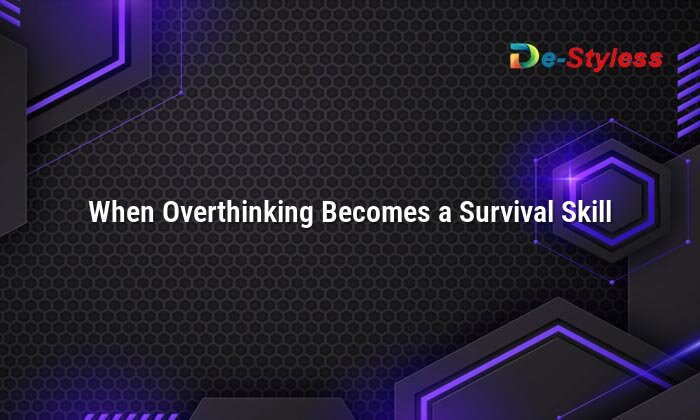Overthinking is often seen as a negative trait. It is commonly associated with anxiety, stress, and unnecessary worry. However, overthinking, when managed correctly, can evolve into a powerful survival skill. In certain situations, the ability to think deeply, analyze every possible outcome, and consider all angles can be the difference between success and failure. Overthinking, in its most effective form, allows individuals to navigate complex decisions, anticipate challenges, and adapt to rapidly changing environments. The key lies in using overthinking constructively rather than allowing it to spiral into an endless loop of doubt.
This article explores the concept of overthinking and how it can be transformed from a seemingly harmful habit into a valuable skill that aids survival in personal, professional, and even high-stakes situations. By understanding when and how to channel overthinking, individuals can turn this tendency into a strategic advantage.
What Is Overthinking?
Overthinking refers to the act of analyzing a situation or problem in great depth, often to the point where it becomes counterproductive. It involves repeatedly revisiting thoughts, considering multiple perspectives, and dwelling on potential outcomes to an excessive degree. While this may sound exhausting, in certain scenarios, the habit of overthinking can help individuals prepare for situations that require meticulous attention to detail.
At its core, overthinking is a form of deep thinking, and deep thinking is an essential cognitive skill. It involves breaking down problems into smaller, more manageable pieces, considering various possibilities, and making well-informed decisions. However, overthinking becomes problematic when it leads to paralysis, indecision, or an overwhelming sense of anxiety, rather than offering clarity and insight.
The Evolution of Overthinking into a Survival Skill
The transition from overthinking as a detrimental habit to a survival skill often depends on the context in which it is applied. In a survival situation, whether it’s navigating a difficult personal challenge, making an important business decision, or responding to an emergency, overthinking can offer critical insights. Here’s how:
1. Risk Assessment and Contingency Planning
Overthinkers tend to consider every possible outcome, both positive and negative. In high-stakes situations, this can be a valuable skill, as it allows for a thorough analysis of risks. By considering all scenarios, including worst-case possibilities, individuals can create contingency plans that address multiple outcomes. This type of preparedness is essential in situations where the stakes are high, and there is little room for error.
2. Strategic Decision Making
In complex decision-making situations, overthinking can lead to a deeper understanding of the available options. Rather than jumping to conclusions, individuals who tend to overthink often weigh all the pros and cons, analyze the potential impact of their decisions, and foresee long-term consequences. This allows them to make more informed choices, particularly in business or personal life, where decisions can have lasting effects.
3. Problem-Solving and Innovation
Overthinking also plays a role in problem-solving. When facing a challenge, overthinkers are less likely to take the first solution that comes to mind. Instead, they explore various alternatives, thinking about creative solutions and examining them from different angles. This depth of thought can lead to innovative solutions that others may overlook. In industries where creativity and problem-solving are key, overthinking can be an asset.
4. Emotional Intelligence and Self-Awareness
Overthinking often involves introspection, which can help individuals gain a better understanding of their emotions, motivations, and reactions. This emotional awareness can be crucial for survival in personal relationships and work environments. People who overthink are typically more attuned to their emotions and how they influence their decisions, making them more empathetic and capable of managing interpersonal dynamics effectively.
The Dangers of Overthinking and How to Manage It
Despite its potential benefits, overthinking can quickly turn into a double-edged sword. When left unchecked, overthinking can lead to anxiety, indecisiveness, and a paralyzing fear of making mistakes. To avoid these pitfalls, it’s important to strike a balance between thoughtful analysis and action. Here are a few tips on how to manage overthinking effectively:
1. Set Time Limits
One of the most common traps of overthinking is spending too much time deliberating on a decision without actually taking action. To manage overthinking, set specific time limits for decision-making or problem-solving. Once the time is up, make a choice based on the information at hand. This helps prevent the cycle of endless pondering and promotes timely action.
2. Prioritize and Simplify
Not all thoughts require equal attention. In some cases, overthinkers can get bogged down by trivial details or scenarios that are unlikely to occur. By prioritizing the most important aspects of a problem or situation and simplifying the thought process, individuals can focus their energy on the decisions that truly matter.
3. Mindfulness and Self-Awareness
Practicing mindfulness can help overthinkers gain better control over their thoughts. By staying present and focused on the current moment, it becomes easier to identify when overthinking is spiraling out of control. Meditation, deep breathing exercises, and self-reflection can help calm the mind and restore balance when overthinking begins to take over.
4. Accept Imperfection
In some cases, overthinking stems from a fear of making mistakes or not having all the answers. Learning to accept imperfection and recognizing that not every decision has to be flawless can reduce the pressure that fuels overthinking. The ability to embrace uncertainty and take calculated risks is a critical skill for survival in many aspects of life.
The Role of Overthinking in High-Stakes Situations
In situations where survival is at stake, overthinking can be the difference between life and death. Whether it’s navigating a dangerous environment, making quick decisions in a medical emergency, or strategizing during a crisis, overthinking can provide the mental clarity and foresight needed to stay ahead of the game.
For example, military personnel or emergency responders must think critically and deeply in high-pressure situations. The ability to analyze multiple possible outcomes, anticipate challenges, and plan accordingly can save lives. Similarly, individuals in extreme survival situations—such as being lost in the wilderness or facing a natural disaster—must constantly assess risks, evaluate their resources, and consider every option to increase their chances of survival.
Conclusion
Overthinking, when managed properly, can evolve from a burdensome habit into a critical survival skill. By carefully considering every possible scenario, overthinkers can prepare for risks, make better decisions, and solve problems in innovative ways. However, like any skill, overthinking requires balance. When it becomes overwhelming or paralyzing, it can cause more harm than good. By setting time limits, simplifying problems, and practicing mindfulness, individuals can harness the power of overthinking without allowing it to control them.
In the end, overthinking becomes a survival skill when it enables individuals to navigate complex situations with greater insight, foresight, and adaptability. It’s about turning a natural tendency into an asset, providing a mental toolkit that aids in decision-making, risk assessment, and ultimately survival.
Glossary
- Overthinking: The process of analyzing a situation or problem to an excessive degree, often leading to indecision or unnecessary stress.
- Risk Assessment: The process of evaluating potential risks and planning for various possible outcomes.
- Contingency Planning: Developing backup plans or strategies in case the primary plan fails.
- Emotional Intelligence: The ability to recognize, understand, and manage one’s own emotions, as well as the emotions of others.
- Mindfulness: The practice of staying present and fully engaged in the moment, often used as a way to manage stress and overthinking.





